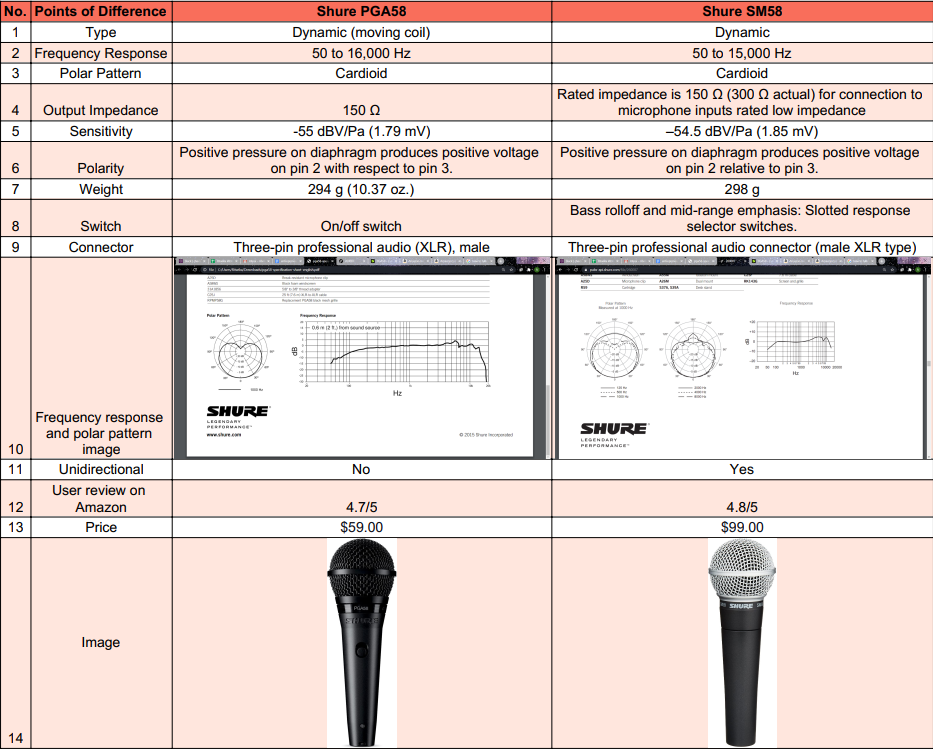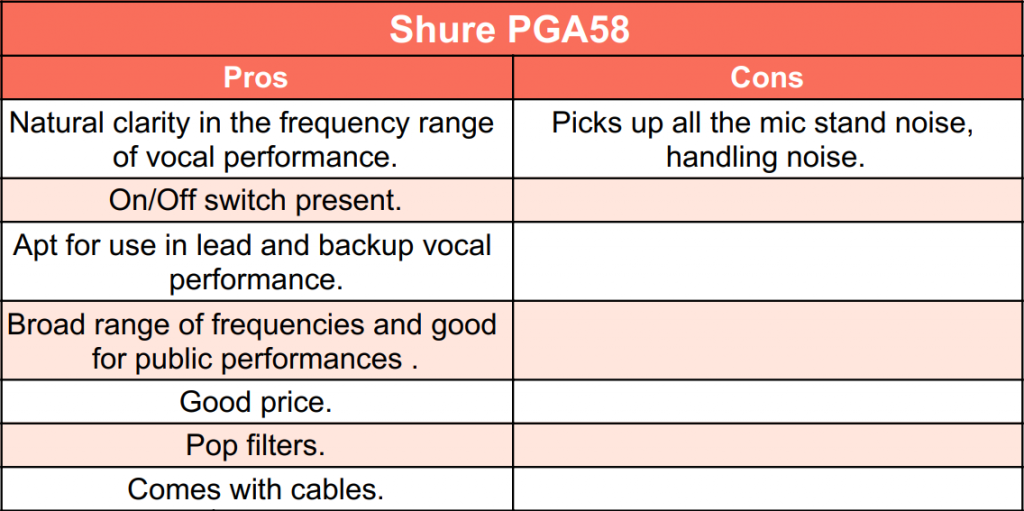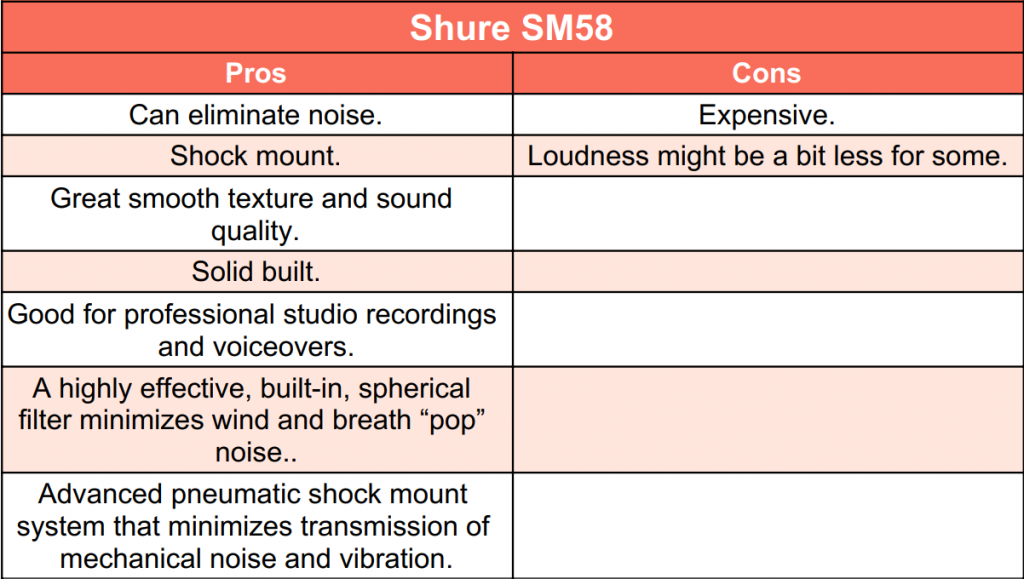Shure PG58 and Shure SM58 are both great XLR microphones for vocal recording, professional studio setups, and others. If you are stuck between the two or feeling confused about which one to buy, then you have come to the right place. We will guide you through product details, comparisons, pros and cons, and more, to help make a choice.
So let’s get started!
Table of Contents
Shure PGA58
It is a great professional-quality XLR microphone with a sleek design, internal shock-mount, pop filters, and an on/off switch. PG58 is a good fit for both recording artists and background voiceovers. So, let’s take a look at further details about this product.

Shure PGA58 Features:
- Nature: High-output dynamic mic that ensures optimum results for both backup and lead vocals.
- Magnet: Neodymium magnet.
- Design: Tailored microphone cartridge design for natural clarity in the frequency range of vocal performance.
- Equipped with: Internal shock mount, pop filter, and on/off switch.
- Cardioid mic: The Cardioid pattern rejects noise and minimizes feedback. Its polar pattern also enables it to pick up sound from the front and sides effectively.
- Frequency response: 50Hz-16kHz.
- Inclusions: 15′ XLR cable, clip, instructional guide, and storage bag.
- Ease of use: Plug-and-play convenience
- Color : Black PG58-XLR
- Frequency response : 60-15,000Hz
- Impedance : 300 ohm
- Output at 1,000Hz : -53dBV/Pa (2.2 mV)
- Weight : 11.3 oz
- User review on Amazon: 4.7/5
- Price: $59.00
Takeaway:
This is a professional quality mic high on durability and easy to handle with the added feature of an on/off switch. It is suitable for both lead and backup singers and has excellent sound quality.
Shure SM58
The Shure SM58 is a unidirectional cardioid microphone equipped with a shock mount system and proper proximity controls. It comes under a reasonable budget and can be an excellent addition as an XLR to your home/studio setup. Let us take a look at some more details about this product.

Shure SM58 Features:
- Frequency response: The frequency response is tailored for midrange and bass, vocals, roll-off to control proximity effect.
- Nature: Cardioid Dynamic Vocal Microphone.
- The uniform cardioid pickup pattern sets the way for maximum gain before feedback and excellent rejection of off-axis sound. Moreover, the consistent cardioid pickup pattern isolates the primary sound source and minimizes background noise.
- Tailored frequency response specially designed for bass roll-off
- Vocals, with brightened midrange and to control the effect for proximity.
- It is equipped with an advanced pneumatic shock mount system that minimizes the transmission of mechanical noise and vibration.
- Effective built-in spherical wind and pop filter. Frequency response: 50 to 15,000 Hz.
- The pneumatic shock-mount system also cuts down the handling of noise.
- It comes furnished with a zippered storage bag and also a break-resistant stand adapter.
- Extremely durable under the most substantial use; assured quality, ruggedness, and reliability.
- User Review on Amazon: 4.8/5
- Price: $99.00
Takeaway:
This is a unidirectional (cardioid) dynamic vocal microphone used for professional vocal use in sound reinforcement and studio recordings. It has a highly effective, built-in, spherical filter that minimizes wind and breath noise. A cardioid pickup pattern isolates the primary sound source while minimizing unwanted background noise. So, if you are looking for an easy-to-use, good quality, durable, value for money product, you can go for this.
Comparisons Between Shure SM58 and Shure PGA58

List of Pros and Cons Shure SM58 and Shure PGA58


Verdict
The Shure SM58 and PGA58 both have similar outputs. The quality, smoothness, and texture of audio are quite excellent in the PGA58. Surprisingly the lower price of PGA58 makes no compromise on the built and quality of sound and is quite impressive. In fact, in many cases, the output of SM58 and PGA58 is quite indistinguishable. The difference crops up when you are handling a mic stand or setting it up on stage. The PGA58 picks up handling noise that might create some woes. However, the inbuilt shock mount system and superb noise cancellation properties of SM58 ensures that no unwanted noise is recorded and all non-essential sounds are filtered.
The PGA58 has an on/off switch that makes it easier for on stage handling and also comes with cables. The price and the fact that it is so close in performance to the SM58 makes it a good choice. However, for studio recordings and professional-grade voiceovers, the SM58 is a rock-solid option. The primary reason is the filtering. The ability to record noise-free sound is especially helpful for recording artists and during live performances. But it is also true that if you are not ready to send a 100 bucks on a mic, the PGA58 is the closest alternative to SM58, without much noticeable difference in audio quality.
Conclusion
Both Shure PGA58 and SM58 are similar in their performance. While one comes at a much lower price, the other is a bit hefty at 100$. But the good news is there is no compromise in quality. You need to understand how exactly you want to use your XLR mic. Because the differences between these two mics are subtle, but depending on utility, it may pose a significant game-changer. For example, the inbuilt shock mount and filters eliminate noise in the SM58 while PGA58 picks it up. This may not be a considerable problem during band performance or choirs or chorus but can make a difference during studio recordings and voiceovers. Professionals often choose SM58 because of its productive, smooth output. The PGA58 does a fantastic job, especially given the price range. Research properly and see what your requirements are. Also, keep in mind the recording environment, scale, and lead or backup positions before making a purchase.

